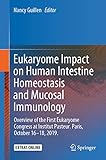Eukaryome Impact on Human Intestine Homeostasis and Mucosal Immunology [electronic resource] : Overview of the First Eukaryome Congress at Institut Pasteur. Paris, October 16–18, 2019. / edited by Nancy Guillen.
Material type: TextPublisher: Cham : Springer International Publishing : Imprint: Springer, 2020Edition: 1st ed. 2020Description: XVII, 367 p. 60 illus., 49 illus. in color. online resourceContent type: text Media type: computer Carrier type: online resourceISBN: 9783030448264Subject(s): Medical microbiology | Parasitology | Microbiology | Molecular biology | Medical Microbiology | Parasitology | Eukaryotic Microbiology | Molecular MedicineAdditional physical formats: Printed edition:: No title; Printed edition:: No title; Printed edition:: No titleDDC classification: 616.9041 LOC classification: QR46Online resources: Click here to access online
TextPublisher: Cham : Springer International Publishing : Imprint: Springer, 2020Edition: 1st ed. 2020Description: XVII, 367 p. 60 illus., 49 illus. in color. online resourceContent type: text Media type: computer Carrier type: online resourceISBN: 9783030448264Subject(s): Medical microbiology | Parasitology | Microbiology | Molecular biology | Medical Microbiology | Parasitology | Eukaryotic Microbiology | Molecular MedicineAdditional physical formats: Printed edition:: No title; Printed edition:: No title; Printed edition:: No titleDDC classification: 616.9041 LOC classification: QR46Online resources: Click here to access online Eukaryome: Emerging field with profound translational potential -- Resolving amoebozoan encystation from Dictyostelium evo-devo and amoebozoan comparative genomics -- Integrative omics analysis of the effect of bacteria on the resistance of Entamoeba histolytica to oxidative stress -- Histomonas meleagridis molecular traits –from past to future -- Exploring the biology and evolution of Blastocystis and its role in the microbiome -- Advances in the study of Blastocystis spp. in Mexico: prevalence, genetic diversity, clinical association and their possible role in the human intestine -- Cryptosporidium infection in Bangladesh children -- The current molecular epidemiological scenario of Cryptosporidium, Giardia and Blastocystis in Spain. Implication for public health -- The protozoome of the periodontal sulcus: from health to disease -- Tritrichomonas spp. and Their Impact on Gut Immune Homeostasis -- Contribution of host immunity to the development of Entamoeba histolytica-induced liver abscess -- Oxidative Stress And Heat Stress In Experimental Amoebic Liver Abscess -- Role of Extracellular Traps promoted by intestinal parasites. Relationship with virulence -- Parasite secretory molecules in host-parasite interaction -- The Role of Host PKCα during Intracellular Cryptosporidium Infection -- Immune response triggered by Entamoeba histolytica in a 3D-intestinal model -- Receptors for phagocytosis and trogocytosis in Entamoeba histolytica -- PtdIns(3,4,5)P3 binding protein screening reveals unique molecules involved in endocytic processes -- Molecular insights into E. histolytica mediated host tissue invasion -- Vesicular trafficking in Entamoeba histolytica is essential for its virulence -- MOLECULAR CHARACTERIZATION OF Entamoeba histolytica tRNA GENES -- Gene silencing and overexpression to study pathogenicity factors of Entamoeba histolytica -- Polyadenylation machineries in intestinal parasites: latest advances in the protozoan parasite Entamoeba histolytica -- Probiotics as anti-Giardia defenders: Overview on putative control mechanisms -- A protocol to quantify cellular morphodynamics: from cell labelling to automatic image analysis.-.
The intestine is home to diverse bacterial communities forming the microbiome that influences host nutrition, immune functions and health. DNA-based methods have been instrumental to gain insight into the microbial eukaryotic diversity of the human gut. For instance, the microbiome share the intestinal ecosystem with a population of uni- and multi-cellular eukaryotic organisms. These eukaryotic organisms are very common and often very abundant in individuals with intestinal healthy conditions as well as those with intestinal diseases. The impact of the relationship between bacterial and eukaryotic organisms within the intestinal ecosystem on homeostasis and intestinal diseases is limited and can be considered an important emerging field of research. In addition, the factors that differentiate pathogenic eukaryotes from commensals are still unknown. Our interest focuses on the families of eukaryotic microbes inhabiting the intestine, called “intestinal eukaryome”, that include fungi, protists and helminths. All these organisms and their interplay with bacteria and the human immune system are a challenge to assess the impact (present and future) of intestinal infectious diseases on public health. This book presents an overview of the science presented and discussed in the First Eukaryome Congress, held from October 16th to 18th, 2019 at Pasteur Institute in Paris, France. This contributed volume is of special interest for PhD students, postdoctoral fellows, researchers and clinicians interested in the effect of the eukaryotic microbiome on human health.
